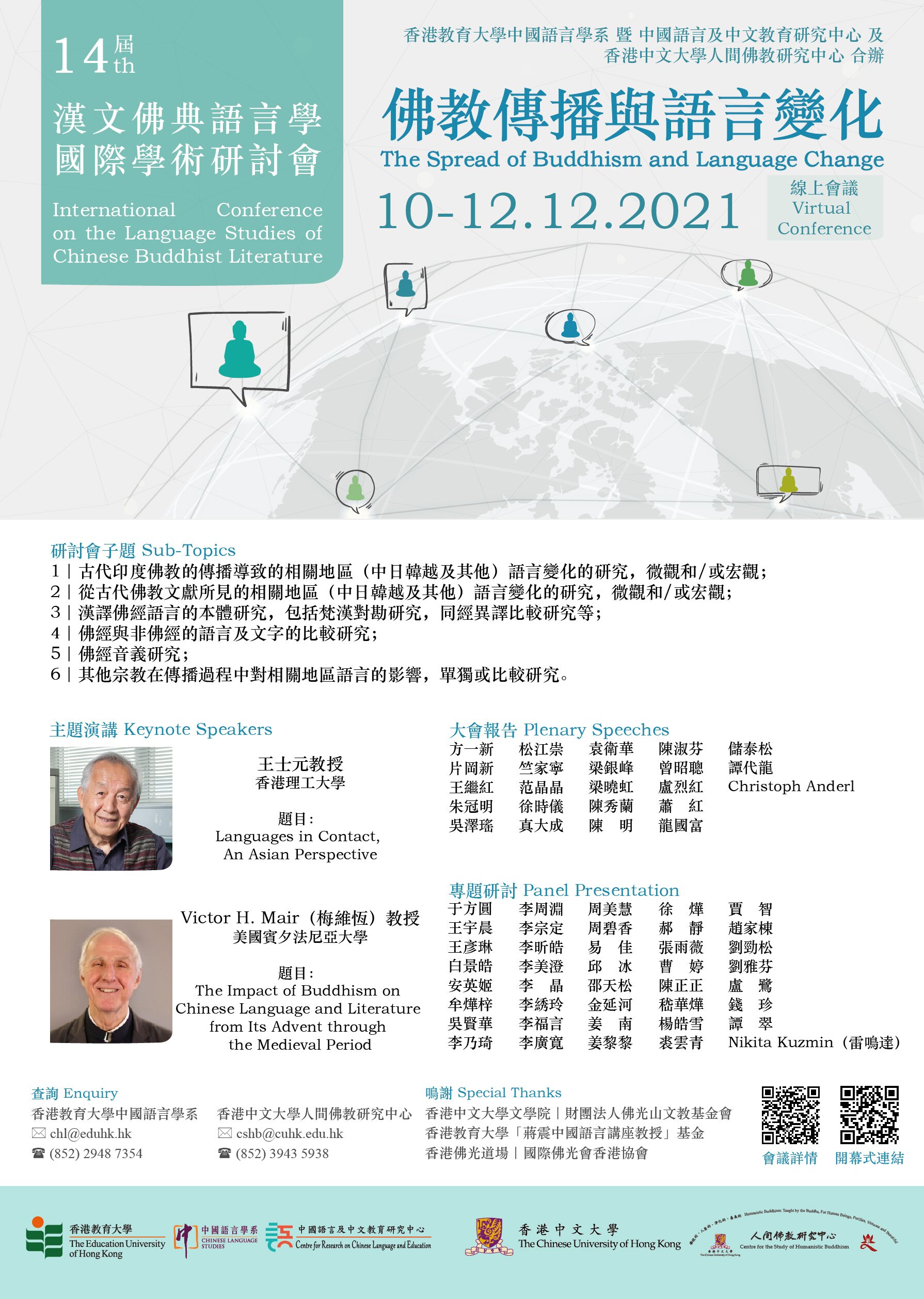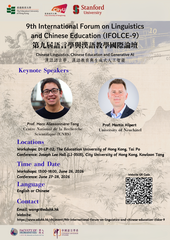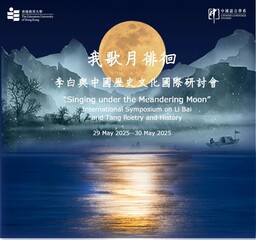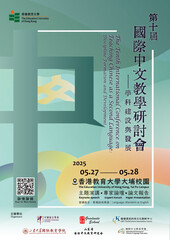The Spread of Buddhism and Language Change - 14th International Conference on the Language Studies of Chinese Buddhist Literature
- 10 Dec, 2021 - 12 Dec, 2021
- Online conference
- Conference
- hwfd2020@126.com
- English | Cantonese | Putonghua
- Department of Chinese Language Studies, The Education University of Hong Kong; Center for Research on Chinese Language and Education, The Education University of Hong Kong; Centre for the Study of Humanistic Buddhism, The Chinese University of Hong Kong
The Spread of Buddhism and Language Change
14th International Conference on the Language Studies of Chinese Buddhist Literature
Organizers
Department of Chinese Language Studies, The Education University of Hong Kong
Center for Research on Chinese Language and Education, The Education University of Hong Kong
Centre for the Study of Humanistic Buddhism, The Chinese University of Hong Kong
Background
The core task of historical linguistics is to trace the trajectory of human language changes in history, describe the process of change, explore the causes of change and summarize the pattern of change and development.
The reasons for the language change are complicated. Among the known causes, language contact is the most important one. The contacts between different languages happen via various channel and ways, and the last thing to ignore is the translinguistic and transcultural transmission of religions. Undoubtedly, the spread of religion on a massive scale always rely on the translation of classical religious canons. In this case, the translation of canons itself, whether it is an oral or written process, is a language contact. The language of any translated work is inevitably influenced by the source language, and this influence is especially obvious in translations of religious classics that are translated by foreign missionaries who are familiar with source language but do not really know target language. Therefore, the translated texts of religious classics usually contain extraordinarily large amount of the source language components, to which the sanctity of the religious classics is attributed. Later, the chant and study of religious classics indisputably bring a huge impact on the believers. This influence is not only reflected in their philosophical, ideological and religious choices, but also expressed in their languages.
The ancient Chinese Buddhist scriptures are the largest religious literature relics in human history, and have important linguistic research value. The International Conference on Chinese Buddhist Languages is an international academic forum for studying the language of Chinese Buddhist scriptures from linguistic perspective. In 2002, the first conference was successfully held in Chaiyi, Taiwan by Taiwan Chung Cheng University. It was later continued by Hunan Normal University (2004), Taiwan Chengchi University and Dharma Drum Institute of Liberal Arts (2008), Peking University (2009), Huazhong University of Science and Technology and Wuhan University (2010), Chungju National University (2012), Guizhou Normal University (2013), Nanjing Normal University (2014), Hokkaido University (2015), Renmin University of China (2016), Taiwan Central University and Fo Guang University (2017), Yonsei University and Kyungsung University (2018), and Guangxi Normal University (2019). It has been held thirteen times at various prestigious institutions, and become an international academic exchange platform for scholars and students working on Chinese Buddhist Languages and related studies.
In order to better understand the relationship between the transmission of religion and language change, especially the relationship between the spread of Buddhism in East Asia and the language changes in East Asian countries, the Department of Chinese Language Studies and Center for Research on Chinese Language and Education in The Education University of Hong Kong, and the Center for the Study of Humanistic Buddhism in The Chinese University of Hong Kong plan to co-organize the 14th International Conference of Chinese Buddhist Languages on the theme of “The Spread of Buddhism and Language Change” in Hong Kong.
Conference Theme
The Spread of Buddhism and Language Change
Sub-Topics
1. Research on language changes in China, Japan, Korea, Vietnam, etc., caused by the spread of Buddhism, and from the perspective of ancient Buddhist literature, microscopic and/or macroscopic.
2. Noumenal research on Chinese-translated Buddhist scriptures, including the research on Sanskrit-Chinese comparative collation, and comparative studies of different translations of the same scripture.
3. Comparative studies of Buddhist and non-Buddhist languages and characters.
4. Research on the Yinyi (dictionaries of pronunciation and meaning) of Buddhist scriptures.
5. The impact of other religions on the development of language(s) in these countries during the process.
Date
10-12 December, 2021
Latest Update (Chinese version only)
三號通知
朱慶之教授閉幕式致辭錄音稿:
Format
Online conference
Languages
.Working Languages: Chinese, English
.Abstract Languages: Chinese, English
.Paper Languages: Chinese, English, Japanese, Korean and Vietnamese are all acceptable. (If the papers are written in Japanese, Korean and Vietnamese, please include a detailed abstract in Chinese or English)
.Speakers presenting in their first language except Chinese and English are required to use PowerPoint slides with Chinese or English translation
Scheme for Young Scholar
.Scholars under 40 years old could apply for the Young Scholar Grant. An independent committee entrusted by the Organizing Committee has been formed to review the applications. Result will be announced in the closing remarks.
Organizing Committee
Chairperson: ZHU Qingzhi (The Education University of Hong Kong), CHEN Chien-huang (The Chinese University of Hong Kong)
Members: The Education University of Hong Kong: CHAU Lap, WU Zeyao, FUNG Kai-chun Steve
The Chinese University of Hong Kong: LI Bohan, CHEN Ken, LAU Po-yin
Email of Secretariat: hwfd2020@126.com
Academic Committee
Chairperson: CHEN Chien-huang, ZHU Qingzhi
Members: CHU Taisong, JIA Zhi, LI Bohan, LIANG Xiaohong, QIU Bing, TAN Dailong, WANG Jihong, XU Shiyi, ZHEN Dacheng, ZHU Guanming, ZENG Zhaocong
Young Scholar Grants Committee
Chairperson: LIANG Xiaohong
Members: CHU Taisong, LIANG Yinfeng, ZHU Guanming
Contact Us
Department of Chinese Language Studies, The Education University of Hong Kong
Website: https://www.eduhk.hk/chl/tc/
Email: chl@eduhk.hk
Tel: (852) 2948 7354
Add: Department of Chinese Language Studies, Room 35A, 1/F, Block B3, 10 Lo Ping Road, The Education University of Hong Kong, Tai Po, N.T., Hong Kong
Centre for the Study of Humanistic Buddhism, The Chinese University of Hong Kong
Website: http://www.cuhk.edu.hk/arts/cshb/
Email: cshb@cuhk.edu.hk
Tel: (852) 3943 5938
Add: Room 204, Fung King Hey Building, The Chinese University of Hong Kong, Shatin, N.T., Hong Kong
Special Thanks
Faculty of Arts, The Chinese University of Hong Kong
Chiang Chen Chair Professor of Chinese Language, The Education University of Hong Kong
Fo Guang Shan Foundation for Buddhist Culture & Education
Fo Guang Vihara (Hong Kong)
Buddha's Light International Association of Hong Kong







